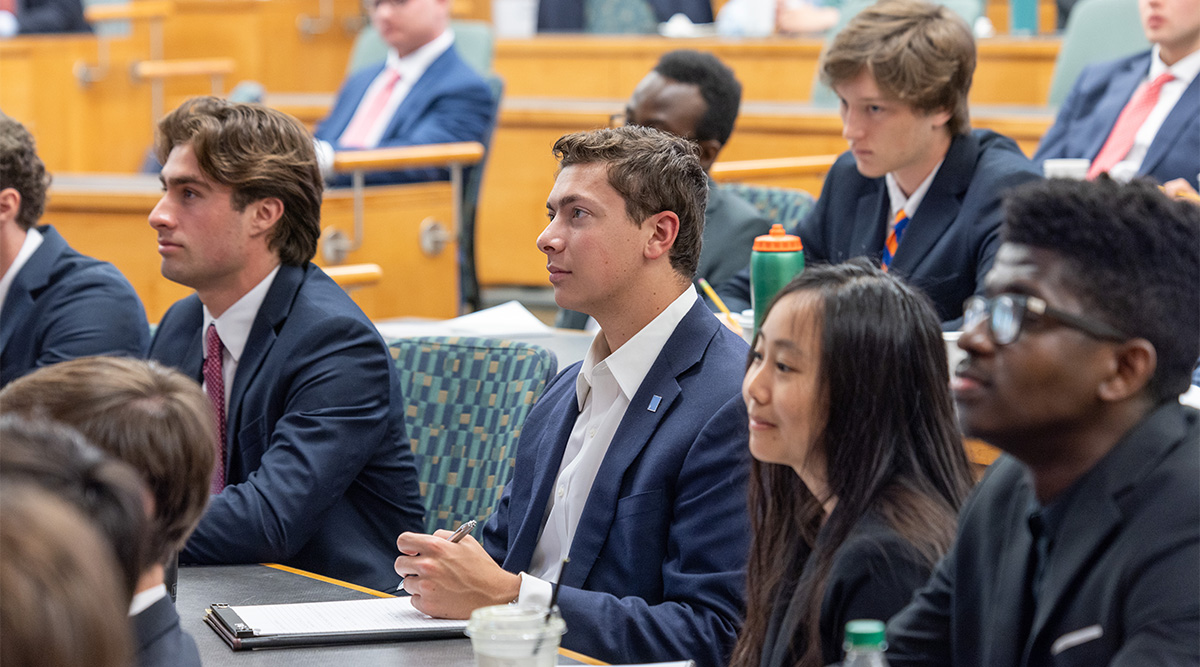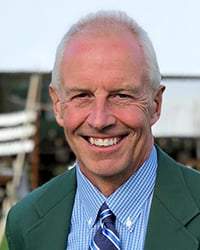
Early Career Advice: Q&A with the Tuck Business Bridge Program’s Ernie Parizeau T’84
The Tuck Business Bridge Program is a three-week intensive that delivers a comprehensive business curriculum to STEM and liberal arts majors. Taught by leading faculty, including those from Tuck’s MBA program, Tuck Bridge includes networking practice, recruiting services, and one-on-one career guidance—preparing students with the skills needed to land their next job or internship.
We sat down with Ernie Parizeau T’84 to chat about teaching in the Bridge Program, his advice for those early in their careers, and what to read to set yourself up for success.
What do you teach in the Tuck Business Bridge Program? Why is it an important topic for recent and soon-to-be grads?
I teach a class called Practical Ethics in the Bridge Program. I’m not an ethicist and don’t have any professional training in philosophy, but everyone should think about how they will react when faced with an ethical dilemma in the workplace.
We all face these dilemmas at some point in our careers, and we are better prepared to handle them if we think about the principles we care about in advance. So, I have students think about some scenarios that might pop up early in their careers and ask them to consider what they would do. I then ask them to list the attributes they want to be known for. A reputation takes years to build and just moments to destroy.
Everyone should read Ralph Waldo Emerson’s essay “Self-Reliance,” where he urges you to trust your instincts and challenge conformity. The pressure to follow traditional career paths can be intense when young. Listening to your inner voice when trying to find your way in the world is a critical skill.
Can you share more about your own business experience?
After graduating from Tuck, I joined a venture capital firm. I worked there for 23 years and loved it. Working with entrepreneurs and balancing the opportunities and risks of investing in early-stage ventures was a fascinating challenge. I’ve been fortunate to have a "second career" teaching entrepreneurship and investing at various colleges. I’m a Professor of the Practice at Middlebury College, where I teach entrepreneurship and coteach a class called Preparing for a Life of Meaning, which focuses on developing what I call "life skills".
What advice do you have for prospective students considering attending Tuck Bridge?
Join the community! You will learn essential skills for any career and meet fascinating people. Education is the best investment any of us can make.
Do you have any reading/listening recommendations for students or those in the early stages of their careers?
A few years ago, I decided to keep a list of books that taught me something. Later, I added podcasts and quotes. The goal was to keep a record of memorable things. Since then, I often ask people for books that have taught them something significant. It’s a great dinner conversation topic.
Life & Career Reads
- We Should Not Be Friends: The Story of a Friendship by Will Schwalbe
- Books For Living by Will Schwalbe
- The Start-Up of You: Adapt, Take Risks, Grow Your Network, and Transform Your Career by Reid Hoffman & Ben Casnocha
- Designing Your Life: How to Build a Well-Lived, Joyful Life by Bill Burnett & Dave Evans
- Rejection Proof: How I Beat Fear and Became Invincible Through 100 Days of Rejection by Jia Jiang
- Essentialism: The Disciplined Pursuit of Less by Greg Mckeown
- A Whole New Mind: Why Right-Brainers Will Rule the Future by Daniel H. Pink
- To Sell is Human: The Surprising Truth About Moving Others by Daniel H. Pink
- Tribe of Mentors: Short Life Advice from the Best in the World by Timothy Ferriss
- The Obstacle Is the Way: The Timeless Art of Turning Trials into Triumph by Ryan Holiday
- The Adventures of Johnny Bunko: The Last Career Guide You’ll Ever Need by Daniel H. Pink
- The Curmudgeon’s Guide to Getting Ahead: Dos and Don’ts of Right Behavior, Tough Thinking, Clear Writing, and Living a Good Life by Charles Murray
- The Monk and the Riddle: The Art of Creating a Life While Making a Living by Randy Komisar
- So Good They Can’t Ignore You: Why Skills Trump Passion in the Quest for Work You Love by Cal Newport
Investing Reads
- Berkshire Hathaway Letters to Shareholders by Warren Buffett
- Red Notice: A True Story of High Finance, Murder, and One Man’s Fight for Justice by Bill Browder
- Irrational Exuberance by Robert J. Shiller
- Manias, Panics, and Crashes: A History of Financial Crises by Charles P. Kindleberger
- The Little Book of Common Sense Investing: The Only Way to Guarantee Your Fair Share of Stock Market Returns by John C. Bogle
- Fooled by Randomness: Hidden Role of Chance in Life and in the Markets by Nassim Nicholas Taleb
- The Snowball: Warren Buffett and the Business of Life by Alice Schroeder
- One Up On Wall Street: How to Use What You Already Know to Make Money in the Market by Peter Lynch
- VC: An American History by Tom Nicholas
Entrepreneurship Reads
- The Art of the Start 2.0 by Guy Kawasaki
- The Code Breaker: Jennifer Doudna, Gene Editing, and the Future of the Human Race by Walter Isaacson
- The Perfect Store: Inside eBay by Adam Cohen
- The Billion Dollar Molecule: One Company’s Quest for the Perfect Drug by Barry Werth
- Bad Blood: Secrets and Lies in a Silicon Valley Startup by John Carreyrou
- Copy This! Lessons from a Hyperactive Dyslexic who Turned a Bright Idea Into One of America’s Best Companies by Ann Marsh & Paul Orfalea
- Hard Drive: Bill Gates and the Making of the Microsoft Empire by James Wallace
- Pour Your Heart Into It: How Starbucks Built a Company One Cup at a Time by Howard Schultz
- Setting The Table: The Transforming Power of Hospitality in Business by Danny Meyer
Fun Story—Some True, Some Made Up—Reads
- The Feather Thief: Beauty, Obsession, and the Natural History Heist of the Century by Kirk Wallace Johnson
- Cork Boat: A True Story of the Unlikeliest Boat Ever Built by John Pollack
- Dog Stars by Peter Heller
- When The English Fall by David Williams
- Wool: Book One of the Silo Series by Hugh Howey
Personal Finance Reads
- Get a Financial Life: Personal Finance in Your Twenties and Thirties by Beth Kobliner
- Why Didn’t They Teach Me This in School? 99 Personal Money Management Principles to Live By by Cary Siegel
Podcasts
- How I Built This by NPR
- The Sydcast by Tuck’s Syd Finkelstein
Quotes to Live By
- “Big ideas are so hard to recognize, so fragile, so easy to kill. Don’t forget that, all of you who don’t have them.”
—John Elliott
- “Often the difference between a successful person and a failure is not one’s better abilities or ideas, but the courage that one has to bet on one’s ideas, to take a calculated risk—and to act.”
—André Malraux
- “Until one is committed there is hesitancy, the chance to draw back, always ineffectiveness. Concerning all acts of initiative or creation, there is one elementary truth...that the moment one definitely commits oneself, then Providence moves, too. All sorts of things occur to help one that would otherwise never have occurred. A whole stream of events issues from the decision, raising in one’s favor all manner of incidents and meetings and material assistance which no man would have believed would have come his way. Whatever you think you can do or believe you can do, begin it. Action has magic, grace, and power in it.”
—W.H. Murray
- “Nothing in this world can take the place of persistence. Talent will not; nothing is more common than unsuccessful men with talent. Genius will not; unrewarded genius is almost a proverb. Education will not; the world is full of educated derelicts. Persistence and determination alone are omnipotent. The slogan Press On! has solved and always will solve the problems of the human race.”
—Calvin Coolidge
- “Shall we make a new rule-of-life … always to try to be a little kinder than is necessary?”
—J.M. Barie

After graduating from Tuck, Ernie Parizeau T’84 became a partner at Norwest Venture Partners. For over 20 years, he invested in early-stage companies in the software, semiconductor, communications, health care, education, and retail industries. He retired from Norwest in 2007 and has since taught entrepreneurship and investing courses at Babson College, Olin College of Engineering, and Middlebury College.


